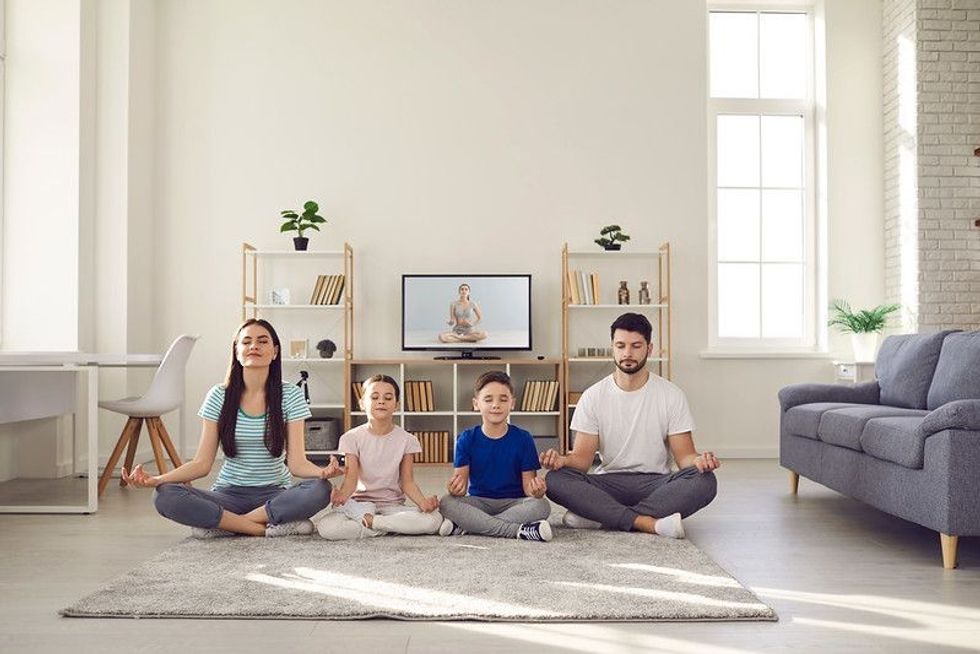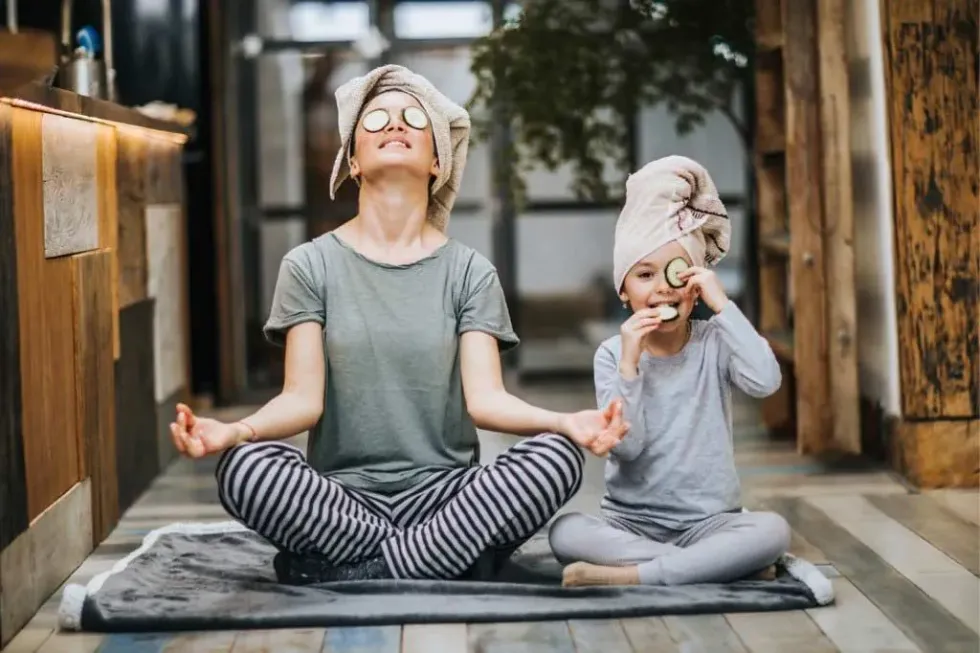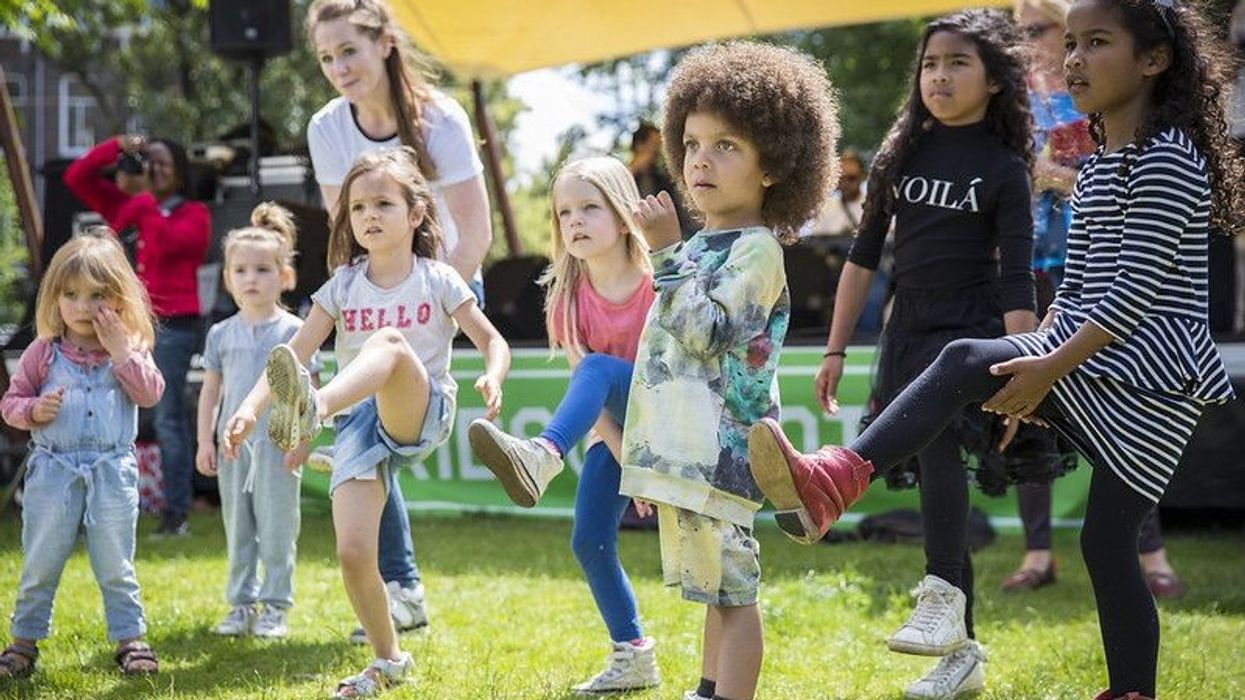Best Mindfulness Resources For Kids At Home
Exploring the concept of mindfulness can usher in a whole new way of understanding for young minds. It can equip them with essential life skills like patience, focus, and empathy, fostering their ability to navigate through life's challenges.
For parents seeking to introduce mindfulness at home, choosing the appropriate resources tailored to kids can make this journey a fulfilling one. When beneficial tools that promote relaxation and self-awareness are made available, children can tap into their feelings and thoughts more effectively, turning everyday moments into opportunities for mindful introspection.
This comprehensive guide takes parents through some top resources to introduce mindfulness meditation to kids in a relatable, engaging manner. With a thoughtful blend of books, apps, and practical activities, these resources make learning about mindfulness an adventure for children.
Understanding The Basics
Engaging with foundational knowledge sets the stage for deeper exploration and insight. This section delves into the core principles of mindfulness practice. You'll learn what mindfulness actually entails and the benefits it can offer. This piece is designed to provide valuable insights, even if you're completely new to the concept.
- Mindfulness has its roots in Buddhist traditions but has been adapted in the West to be secular and accessible to all, irrespective of religious or cultural background.
- Multiple scientific studies have proven the benefits of mindfulness practice, ranging from improved mental health to enhanced cognitive functions.
- While meditation is a popular way of practicing mindfulness, the core of mindfulness is about maintaining a moment-by-moment awareness of our thoughts, feelings, bodily sensations, and surrounding environment.
- An interesting way to understand the essence of being present is the 'chocolate meditation'. It involves eating a piece of chocolate very slowly, savoring its taste, texture, and other nuances. This simple exercise can teach a lot about the richness of the present moment.
- A common misconception is that mindfulness is about emptying the mind. Instead, it's about becoming aware of what's happening in the mind without judgment.
- Mindfulness training, while it may seem complex, can be adapted for all ages, including children and elementary school students, to promote mental peace and awareness early on.
The Benefits Of Mindfulness For Kids

Teaching mindfulness to kids has become increasingly popular in recent years due to the potential for benefits. Its positive impact on children's physical health, mental well-being, and academic performance has made this practice an invaluable tool for parents and educators alike.
Beyond helping children to navigate their early years, it gives them lifelong skills to thrive in the world more effectively.
- Mindfulness equips kids with tools to recognize and manage their emotions, leading to fewer outbursts or tantrums and better interpersonal relationships.
- Through mindfulness exercises, children can learn techniques to manage and reduce their stress levels, which can be especially beneficial during exams or other challenging situations.
- Mindfulness practices can improve working memory in children, aiding in their academic and personal tasks.
- Some studies suggest that mindfulness can help in alleviating symptoms of anxiety and mild depression in children.
- Mindfulness promotes an awareness of one's thoughts and feelings, helping kids understand themselves better and make informed decisions.
- Regular mindfulness and meditation can promote better sleep patterns, helping kids feel more rested and alert during the day.
- Mindfulness practices can nurture a sense of understanding and compassion for others, encouraging positive social interactions and friendships.
- Being present and mindful can unleash creativity, allowing kids to see things from different perspectives and think outside the box.
- Through self-awareness and self-compassion practices, children can develop a healthier self-image and increased confidence.
- Mindfulness practices often include exercises that cultivate a sense of gratitude, teaching children to appreciate the good in their lives
Simple Mindfulness Activities For Kids
Teaching mindful awareness to children can be a powerful tool in helping them improve focus, manage stress, and develop empathy. With the hustle and bustle of modern life, it becomes increasingly important to cultivate these skills early on.
Here are some easy, engaging, and beneficial mindfulness activities designed specifically for kids to teach them about being present, regulating emotions, and improving attention span.
- Belly Breathing: This technique encourages children to focus on their breath, watching their bellies rise and fall. It's an effective way to introduce kids to the concept of being present and aware.
- Mindful Walking: Whether inside or outside, walking mindfully, with attention to each step and feeling, can be a calming exercise.
- Body Scan: This technique teaches children to mentally scan their bodies from head to toe, noting any sensations, tension, or relaxation along the way.
- Mindful Coloring: Using coloring books or sheets, children can focus their attention on the act of coloring, noting the colors they choose, the sensation of the crayon or pencil, and the patterns they create.
- Mindful Storytelling: Narrate a calming story and ask kids to visualize it, engaging their imagination in a mindful way.
- Mindful Eating: Encouraging kids to eat slowly, savoring each bite, noting textures, flavors, and temperatures, can turn mealtime into a lesson in mindfulness.
- Mindful Stretching: Simple stretching exercises, where kids pay attention to the feel of each stretch and movement, can be a great way to incorporate mindfulness and physical activity.
- Gratitude Journaling: While suitable for older kids, maintaining a gratitude journal where they note things they're thankful for each day can promote mindfulness and a positive perspective.
- Mindful Glitter Jar: Filled with water, glitter, and glue, kids can shake the jar and watch the glitter settle, representing how our thoughts and feelings can settle when we take a moment to breathe and observe.
- Feeling Check-ins: Periodically throughout the day, kids can take a moment to name and acknowledge their feelings, helping them become more in tune with their emotional states.
- Nature Observation: Simply watching clouds, observing ants, or looking at the stars can be an excellent way for children to practice mindfulness while connecting with nature.
- Mindful Listening: Playing a song or tune and asking kids to listen closely to the instruments, rhythms, or melodies is a way to develop their auditory attention and appreciation.
- The Five Senses Exercise: Ask kids to note one thing they can see, one they can touch, one they can hear, one they can smell, and one they can taste. This anchors them to the present moment through their senses.
- Pause and Breathe: Incorporate short breaks during the day for kids to simply pause and take a few deep breaths, grounding them in the present.
- Mindful Puzzles: Simple jigsaw puzzles or bead threading can help children concentrate and focus on the task at hand.
- Yoga Poses For Kids: Introducing simple yoga poses, with attention to breathing and movement, can be a playful way to incorporate mindfulness and physical exercise.
- Silent Time: Allocate a short period where kids can sit silently, focusing on their breathing or the sounds around them, introducing them to meditation in a gentle way.
- Blindfolded Sensory Exploration: Blindfold kids and hand them various objects to feel, smell, or even taste, challenging them to identify the items and describe the experience.
Children's Books On Mindfulness
A tangible and engaging way to introduce the concept of mindfulness to children is through books. Children's books on mindfulness are effective tools that combine engaging narratives with practical exercises. They teach kids how to quiet their minds, manage their emotions, and cultivate empathy towards others.
- I Am Peace: A Book Of Mindfulness By Susan Verde, Illustrated By Peter H. Reynolds: This beautifully illustrated book follows a child who learns to navigate difficult feelings and find peace through mindfulness practices.
- Mindful Monkey, Happy Panda By Lauren Alderfer, Illustrated By Kerry Lee MacLean: Through a dialogue between Monkey and Panda, this book teaches children about the benefits of being present. Panda demonstrates how to live fully in the moment, leading Monkey to understand the joy of mindfulness.
- A Handful Of Quiet: Happiness In Four Pebbles By Thich Nhat Hanh: Drawing from Buddhist traditions, this interactive book introduces kids to a simple and enjoyable pebble meditation they can do on their own. It's a hands-on activity to understand peace, clarity, and more.
- The Lemonade Hurricane: A Story Of Mindfulness And Meditation By Licia Morelli, Illustrated By Jennifer E. Morris: Through the story of siblings Emma and Henry (a hurricane of energy), this book teaches children about meditation and the calming power of breath.
- Mind Bubbles: Exploring Mindfulness With Kids By Heather Krantz, Illustrated By Stacy Heller Budnick: Using the metaphor of bubbles, the book helps children understand their emotions, thoughts, and sensations, teaching them how to 'pop' mind bubbles through the act of mindful attention.
- Bee Still: An Invitation To Meditation By Frank J. Sileo, Illustrated By Claire Keay: Bentley the Bee discovers the benefits of meditation and learns how to be still, calm, and present in the moment, teaching kids that they can do the same.
- Mindfulness For Kids: 30 Fun Activities To Stay Calm, Happy, And In Control By Carole P. Roman And J. Robin Albertson-Wren: This workbook is filled with a variety of exercises and activities for kids to learn mindfulness techniques, focusing on breathing, sensations, and thoughts.
- My Magic Breath: Finding Calm Through Mindful Breathing By Nick Ortner And Alison Taylor, Illustrated By Michelle Polizzi: This engaging book helps children explore the power of their breath and how they can use it to feel better when they're upset, teaching the basics of mindful breathing.
- Moody Cow Meditates By Kerry Lee MacLean: After a series of unfortunate events, Peter the Cow is in a bad mood. With the help of his grandfather, Peter learns a fun way to tame his mood through meditation. This story provides a playful approach to introducing kids to the concept of meditation.
- Alphabreaths: The ABCs Of Mindful Breathing By Christopher Willard And Daniel Rechtschaffen, Illustrated By Holly Clifton-Brown: This creative book teaches children the alphabet alongside different types of 'breaths,' helping them learn both literacy and relaxation techniques in tandem.
- Mindful Me: Mindfulness And Meditation For Kids By Whitney Stewart: This guide offers a comprehensive look into mindfulness for kids, filled with practices, meditations, and techniques specifically designed for children to lead a more mindful life.
- Just Breathe: Meditation, Mindfulness, Movement, And More By Mallika Chopra, Illustrated By Brenna Vaughan: Written for older children (8-12 years), this book provides practical advice on how to de-stress, focus, and improve one's emotional balance.
Mindfulness Apps For Children
Mindfulness apps specifically designed for children offer an excellent way to introduce them to mindfulness. These apps can be a great addition to a child's daily routine, offering exercises and techniques for relaxation and calm. Explore some of the best available mindfulness apps that children can utilize, turning screen time into a productive, calming experience.
- Smiling Mind: This Australian-based app offers mindfulness programs tailored for a range of age groups, including children. The kid-friendly exercises aim to improve attention, compassion, and emotion regulation.
- Headspace: Kids: A segment of the larger Headspace app, this section is designed specifically for kids. It offers simple exercises to introduce children to meditation, helping them manage their feelings and achieve better sleep.
- Cosmic Kids Yoga: A fusion of yoga and mindfulness, this app offers themed yoga and relaxation tailored to kids. Through engaging stories and poses, children are taught to breathe, move, and relax.
- MyLife Meditation (Formerly Stop, Breathe & Think): This app offers a wide range of mindfulness activities and also has a special section for kids and teens. The content includes guided meditations, emotional check-ins, and sleep stories.
- Breathe, Think, Do With Sesame: This delightful app from Sesame Street guides children through calming exercises. With the help of a friendly monster, kids learn the 'breathe, think, do' method for problem-solving and self-regulation.
- Mindful Powers: This app is tailored to help kids learn about mindfulness. Through a series of interactive stories and activities, it teaches children about the importance of being present and managing emotions.
- Moshi: Sleep And Mindfulness: Moshi offers calming bedtime stories, music, and sounds. With a collection of over 40 sleep stories narrated by calming voices, it's designed to help kids relax and drift into sleep.
- BuddhaBoo Kids Meditation: A great introduction to meditation for kids, this app provides a range of guided meditations on topics like relaxation, sleep, and focus.
- MindYeti: A tool for teaching kids about mindfulness, this app offers a series of audio sessions to help kids calm down, focus, and connect better with the world around them.
- Insight Timer - Kids: A popular meditation app for adults, Insight Timer also offers content specifically tailored for kids, with guided meditations and stories designed to help them relax, concentrate, and manage emotions.
Guides For Parents To Teach Kids Mindfulness
Mindfulness, the practice of being consciously aware of one's environment, emotions, and body, is an essential skill to cultivate, especially for children. As parents, guidance is needed to teach this important life skill.
This section offers effective resources that can be used to introduce mindfulness to kids. Here are some recommended guides for parents looking to teach mindfulness to their kids.
- The Mindful Child: How to Help Your Kid Manage Stress And Become Happier, Kinder, And More Compassionate By Susan Kaiser Greenland: A step-by-step guide offering techniques and activities to help children embrace mindfulness. Greenland simplifies complex principles into kid-friendly practices.
- Sitting Still Like A Frog: Mindfulness Exercises For Kids (And Their Parents) By Eline Snel: This book offers simple mindfulness practices to help kids deal with anxiety, improve concentration, and handle difficult emotions. It includes a CD with guided meditations specifically for children.
- Mindful Games By Susan Kaiser Greenland: Greenland introduces 50 engaging games and activities designed specifically for teaching children about mindfulness in an interactive manner.
- Calm Kids: Help Children Relax With Mindful Activities By Lorraine E. Murray: Murray offers a range of step-by-step activities to familiarize children with mindfulness and meditation, helping them find calm and reduce anxiety.
- Breathe Like A Bear By Kira Willey: A collection of short, interactive exercises designed for kids to foster attention, self-regulation, and mindfulness in enjoyable ways.
- Growing Up Mindful: Essential Practices To Help Children, Teens, And Families Find Balance, Calm, And Resilience By Christopher Willard, PsyD: A comprehensive guide providing strategies and practices for parents and families to incorporate mindfulness across different age groups.
- Mindful Schools Online Courses: Tailored primarily for educators but beneficial for parents, these courses focus on how to weave mindfulness practices into children's everyday experiences.
- Mindful Parenting Online Course By Susan Kaiser Greenland: This course offers parents in-depth strategies and practices to embed mindfulness into their child's daily routine, strengthening focus and emotional resilience.
- The Still Quiet Place Online Course By Dr. Amy Saltzman: Dr. Saltzman provides tools and strategies in an online format for parents to teach their children mindfulness, fostering calmness and attention.
- Connected Kids - Teach Children Meditation Programme: An online platform that instructs parents on introducing meditation and mindfulness to children, including those with special needs.
- The Goldie Hawn Foundation's MindUP Program: This program is a comprehensive curriculum teaching mindfulness to children. The foundation also provides resources for parents to support and extend this teaching at home.
Mindfulness is a valuable skill that can help children navigate their thoughts and emotions in a productive manner. These resources offer various ways in which you can introduce and instill this practice within your child's daily routine at home.
Through books, apps, and online resources, it's never been easier to create a mindfulness-friendly environment that will undoubtedly aid your child's growth. Remember, practicing mindfulness is not a one-time event, but a lifelong journey.
We Want Your Photos!
More for You
See All
Bachelor of Science specializing in Computer Science

Christian MbaBachelor of Science specializing in Computer Science
Christian Mba is an experienced blogger and content writer with over a decade of experience. He holds a Bachelor of Science degree in Computer Science from Nigeria and has a keen interest in Python programming. Along with his writing and blogging expertise, he is also an SEO specialist with more than six years of experience. Chris, as he is commonly known, has a passion for music and enjoys playing the piano.
Disclaimer
1) Kidadl is independent and to make our service free to you the reader we are supported by advertising. We hope you love our recommendations for products and services! What we suggest is selected independently by the Kidadl team. If you purchase using the Buy Now button we may earn a small commission. This does not influence our choices. Prices are correct and items are available at the time the article was published but we cannot guarantee that on the time of reading. Please note that Kidadl is a participant in the Amazon Services LLC Associates Program, an affiliate advertising program designed to provide a means for sites to earn advertising fees by advertising and linking to Amazon. We also link to other websites, but are not responsible for their content.
2) At Kidadl, we strive to recommend the very best activities and events. We will always aim to give you accurate information at the date of publication - however, information does change, so it’s important you do your own research, double-check and make the decision that is right for your family. We recognise that not all activities and ideas are appropriate for all children and families or in all circumstances. Our recommended activities are based on age but these are a guide. We recommend that these ideas are used as inspiration, that ideas are undertaken with appropriate adult supervision, and that each adult uses their own discretion and knowledge of their children to consider the safety and suitability. Kidadl cannot accept liability for the execution of these ideas, and parental supervision is advised at all times, as safety is paramount. Anyone using the information provided by Kidadl does so at their own risk and we can not accept liability if things go wrong.
3) Because we are an educational resource, we have quotes and facts about a range of historical and modern figures. We do not endorse the actions of or rhetoric of all the people included in these collections, but we think they are important for growing minds to learn about under the guidance of parents or guardians.







